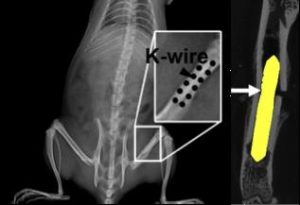Prashant Kumta, PhD, Scientific PI
Professor of Bioengineering & Material Science
Engineering Director, Center for Craniofacial Regeneration
Founding Director, CCEMM
Email: pkumta@pitt.edu
Phone: (412) 648-0223
http://www.pitt.edu/~pkumta
Vijay Gorantla, MD, PhD, Clinical PI
Associate Professor of Plastic Surgery
Administrative Medical Director, Pittsburgh Reconstructive Transplant Program
Email: vsg2@pitt.edu
Phone: (412) 383-6881
 Every year about 320,000 procedures to fix bone fractures are performed using Kirschner wires (K-wires) to hold bone fragments in place during healing, an annual market of about $210 million dollars. Because K-wires are typically left to protrude through the skin during healing, for easy removal, their use typically has a high complication rate (up to 42% has been reported). Complications include infection at the insertion site, loosening, migration and severe infection of the bone. These products also require a secondary procedure for removal once healing is complete, which itself costs money and increases recovery time. MagWire, a bioresorbable magnesium alloy version of these devices, will have sufficient mechanical strength to directly replace traditional stainless steel K-wires, but will resorb over time. This feature eliminates the need to remove the wires, thereby reducing risk of infection and associated complications. Thus, MagWire has the potential to significantly increase patient outcomes and decrease healthcare costs associated with treating bone fractures.
Every year about 320,000 procedures to fix bone fractures are performed using Kirschner wires (K-wires) to hold bone fragments in place during healing, an annual market of about $210 million dollars. Because K-wires are typically left to protrude through the skin during healing, for easy removal, their use typically has a high complication rate (up to 42% has been reported). Complications include infection at the insertion site, loosening, migration and severe infection of the bone. These products also require a secondary procedure for removal once healing is complete, which itself costs money and increases recovery time. MagWire, a bioresorbable magnesium alloy version of these devices, will have sufficient mechanical strength to directly replace traditional stainless steel K-wires, but will resorb over time. This feature eliminates the need to remove the wires, thereby reducing risk of infection and associated complications. Thus, MagWire has the potential to significantly increase patient outcomes and decrease healthcare costs associated with treating bone fractures.
